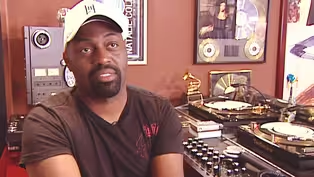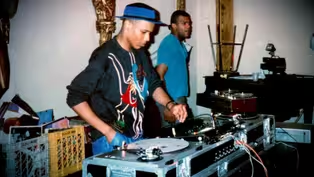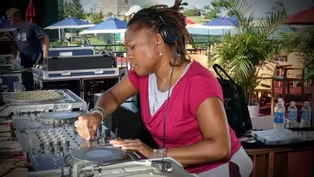Chicago Stories
Disco's Revenge
Clip: 11/8/2024 | 3m 47sVideo has Closed Captions
An anti-disco movement spurs the development of house music.
An anti-disco movement believed to be rooted in racism and homophobia drives disco underground. But house music reemerges as a new genre.
Problems playing video? | Closed Captioning Feedback
Problems playing video? | Closed Captioning Feedback
Chicago Stories is a local public television program presented by WTTW
Lead support for CHICAGO STORIES is provided by The Negaunee Foundation. Major support is provided by the Abra Prentice Foundation, Inc. and the TAWANI Foundation.
Chicago Stories
Disco's Revenge
Clip: 11/8/2024 | 3m 47sVideo has Closed Captions
An anti-disco movement believed to be rooted in racism and homophobia drives disco underground. But house music reemerges as a new genre.
Problems playing video? | Closed Captioning Feedback
How to Watch Chicago Stories
Chicago Stories is available to stream on pbs.org and the free PBS App, available on iPhone, Apple TV, Android TV, Android smartphones, Amazon Fire TV, Amazon Fire Tablet, Roku, Samsung Smart TV, and Vizio.
Providing Support for PBS.org
Learn Moreabout PBS online sponsorship- [Narrator] In the 1970s, most gay people had to hide their sexual identities.
The Warehouse was one of the few places where gay Black and Latino people could gather and have the freedom to be themselves.
A crowd of more than 500 packed the club every weekend.
- It opened at midnight on Saturday night and it closed at noon on Sunday.
For a lot of people, you know, that was all they needed was that one night.
They would live all week for that one night, which was great.
(upbeat music) - Queer Black people most certainly needed to gather and create a safe space for them.
If queer Black people are safe, then everybody else is going to be safe.
- Most of white kids would say, "You'd never catch me down there," because they just had it fixed in their mind what was going on.
But they had never been there, so they really didn't know.
But there was a handful that were really daring and was really into it, and they came down there and they danced like it was nobody's business.
I mean, it just all worked.
Nobody saw color.
Everybody was too busy dancing and enjoying the music and having a good time.
- [Narrator] Disco was having its moment.
The music was uniting people on the dance floor and skyrocketing in the mainstream market.
But an anti-disco movement was growing around the nation, one believed to be rooted in racism and homophobia.
In Chicago, local shock jock, Steve Dahl, led the charge.
He had lost his job when his station switched from rock and roll to disco.
- [Crowd] Disco sucks!
Disco sucks!
Disco sucks!
- "Disco sucks" was Dahl's rallying cry, as he amassed a crowd of 50,000 for the disco demolition during a White Sox doubleheader at Comiskey Park.
98 cent tickets were sold to anyone who brought disco records to destroy.
(crowd cheers) Dahl detonated the vinyl as crowds stormed the field.
- I was a kid watching that on the news, like it was terrifying.
They were burning a lot of Black records, Black music.
It was like watching a Klan rally.
- [Narrator] Dahl denied the event was racist or homophobic, saying quote, "We were just kids pissing on a musical genre."
- We didn't blow up Jimi Hendrix records.
We didn't blow up David Bowie records.
It was just, it was really just a rock and roll versus disco thing.
- The irony of course being that rock and roll is and was Black music and that is the genre that is used to beat back Black dance music.
- The whole debacle that happened in Comiskey Park, there were like a lot of really big commercial discos and then all of a sudden, like in 24 hours, they all just completely disappeared.
- [Narrator] Disco demolition devastated the industry.
Record companies shut down dance departments, artists were dropped by major labels, and disco nearly disappeared from the Billboard charts.
- Disco demolition, it created the underground scene because all the DJs went underground.
- [Narrator] Out of the violence came a new incarnation of disco called house music.
- And I think that Frankie said it best when he said,
From the WTTW Archives: An Interview with Frankie Knuckles
Video has Closed Captions
Clip: 11/8/2024 | 3m 27s | DJ Frankie Knuckles discusses the early days of house music at the Warehouse in this 2004 interview. (3m 27s)
Video has Closed Captions
Clip: 11/8/2024 | 8m 56s | A group of Chicago friends plant the seeds of house music. (8m 56s)
Video has Closed Captions
Clip: 11/8/2024 | 5m 13s | Women were not always welcome as house music DJs. (5m 13s)
Providing Support for PBS.org
Learn Moreabout PBS online sponsorshipSupport for PBS provided by:
Chicago Stories is a local public television program presented by WTTW
Lead support for CHICAGO STORIES is provided by The Negaunee Foundation. Major support is provided by the Abra Prentice Foundation, Inc. and the TAWANI Foundation.


















